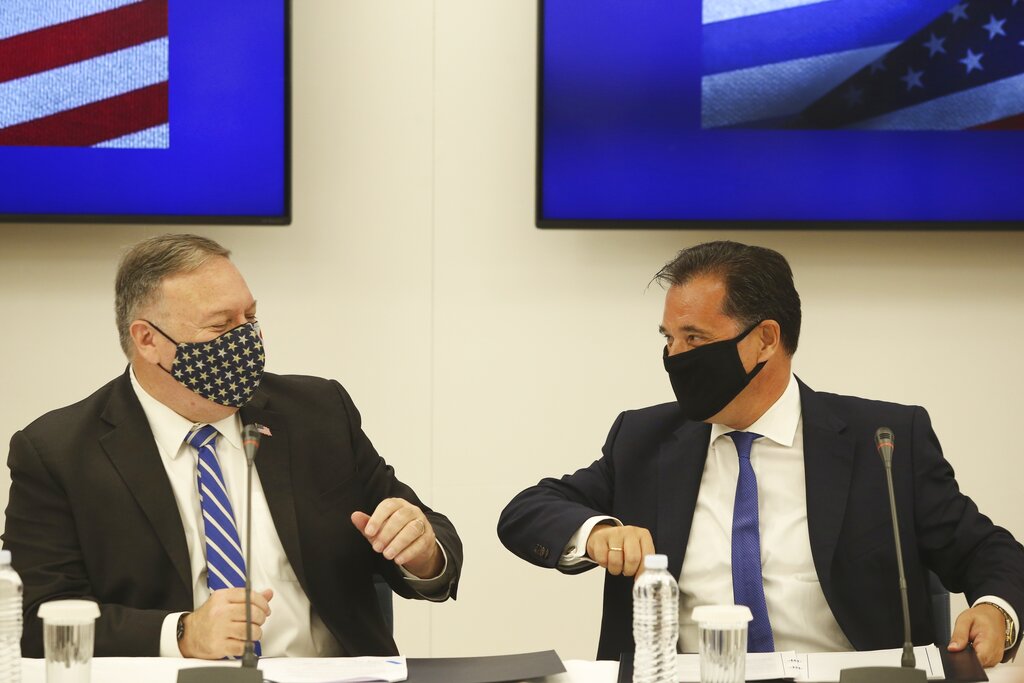THESSALONIKI, Greece — Secretary of State Mike Pompeo backed Greece amid tensions with Turkey over control of energy-rich Mediterranean waters, touting security cooperation with Athens in a statement freighted with implicit rebukes of Ankara.
“The United States and Greece shared views on the Eastern Mediterranean and reaffirmed their belief that maritime delimitation issues should be resolved peacefully in accordance with international law,” the two governments said in a joint statement following Pompeo’s meeting with Greek Foreign Minister Nikos Dendias. “The United States and Greece also reiterated their dedication to enhancing their close cooperation as NATO Allies, using all appropriate means at their disposal, to safeguard stability and security in the wider region.”
That statement, with its emphasis on the peaceful resolution of disputes, is an unmistakable repudiation of Turkey’s deployment of warships and a research vessel in disputed waterways of the Eastern Mediterranean. The standoff has eased somewhat in light of Turkish President Recep Tayyip Erdogan’s decision to withdraw the ships, but that may only be a temporary relief for a crisis that already has seen a “mini collision” between Greek and Turkish ships.
“The ship will be back once it is refueled and maintenance is completed,” Turkish Foreign Minister Mevlut Cavusoglu said Sunday.
European powers plan to impose economic sanctions on Turkey if Erdogan “brings the ships out again,” according to a senior European diplomat. “The sectoral ones are now on the table, but they will not be implemented as long as Turkey behaves,” the envoy said.

Still, as Erdogan seemed to acquiesce in one theater, violence erupted Sunday in disputed territory between Armenia and Azerbaijan — a pair of former Soviet satellites with close ties, respectively, to Greece and Turkey.
“Azerbaijan will surely use its right of self-defense to protect its people and its territorial integrity,” the Turkish Foreign Ministry said Sunday. “In this vein, Turkey fully supports Azerbaijan with unwavering solidarity. We will stand by Azerbaijan whichever way it prefers.”
Pompeo’s team, by contrast, warned against foreign intervention in the crisis. “The United States believes participation in the escalating violence by external parties would be deeply unhelpful and only exacerbate regional tensions,” State Department spokeswoman Morgan Ortagus said Sunday.
Pompeo skipped Turkey in his tour of the region while making two stops in Greece this week, which marks his second visit to the country in the last year. Diplomatic observers regard that itinerary as a sign that U.S. patience with Erdogan is wearing thin, despite his previous friendliness with President Trump.
“Pompeo doesn’t freelance,” an Arab official said. “That’s a pretty calibrated strategy … he doesn’t just go off and do things on his own.”
Erdogan’s maneuvering in the Eastern Mediterranean has raised the specter of a historic clash between NATO allies, just as Trump enters the home stretch of a difficult reelection bid. The timing of Pompeo’s trip prompted the senior European diplomat to surmise that Trump wanted to avoid “an incident before the election.”
“You can accuse him of many things, but he’s not stupid,” the envoy said of Trump.

